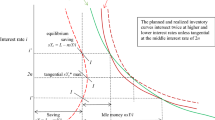Abstract
This paper analyzes the existence of recursive equilibria in a class of convex growth models with incomplete markets. Households have identical CRRA-preferences, production displays constant returns to scale with respect to physical and human capital, and all markets are competitive. There are aggregate productivity shocks that affect aggregate returns to physical and human capital investment (stock returns and wages), and there are idiosyncratic shocks to human capital (idiosyncratic depreciation shocks) that only affect individual human capital returns. Aggregate and idiosyncratic shocks follow a joint Markov process. Conditional on the aggregate state, idiosyncratic shocks are independently distributed over time and identically distributed across households. Finally, households have the opportunity to trade assets in zero net supply with payoffs that depend on the aggregate shock, but markets are incomplete in the sense that there are no assets with payoffs depending on idiosyncratic shocks. It is shown that there exists a recursive equilibrium for which equilibrium prices (returns) only depend on the exogenous aggregate shock variable (the wealth distribution is not a relevant state variable). Moreover, the allocation associated with this recursive equilibrium is identical to the equilibrium allocation of an economy in which households live in autarky and face both aggregate and idiosyncratic risk.
Similar content being viewed by others
References
Aiyagari R. (1994). Uninsured idiosyncratic risk and aggregate saving. Q J Econ 109:659–84
Alvarez F., Stokey N. (1998). Dynamic programming with homogeneous functions. J Econ Theory 82:167–189
Angeletos, G., Calvet, L.: Idiosyncratic production risk, growth, and the business cycle. Working paper (2004)
Atkeson A., Lucas R. (1992). On efficient distribution with private information. Rev Econ Stud 59:427–453
Becker R., Boyd J. (1997). Capital theory, equilibrium analysis, and recursive utility. Blackwell, Oxford
Becker R., Zilcha I. (1997). Stationary ramsey equilibria under uncertainty. J Econ Theory 75:122–141
Ben-Porath Y. (1967). The production of human capital and the life-cycle of earnings. J Polit Econ 75:352–365
Caballe J., Santos M. (1993). On Endogenous growth with physical and human capital. J Polit Econ 101:1042–67
Calvet L. (2001). Incomplete markets and volatility. J Econo Theory 98:295–338
Cole H., Kocherlakota N. (2001). Efficient allocations with hidden income and hidden storage. Rev Econ Stud 68:523–542
Coleman W.J. II. (1992). Equilibrium in a production economy with an income tax. Econometrica 59:1091–1104
Constantinides G., Duffie D. (1996). Asset pricing with heterogeneous consumers. J Polit Econ 104:219–240
Datta M., Mirman, L., Morand, O., Reffett K.: Markoviam equilibrium in infinite-horizon economies with incomplete markets and public policy. Working paper (2004)
Den Haan W. (1997). Solving dynamic models with aggregate shocks and heterogenous agents. Macroecon Dyn 1:355–386
Duffie D., Geanakoplos J., Mas-Colell A., Mc Lennan A. (1994). Stationary markov equilibria. Econometrica 62:745–781
Greenwood J., Huffman G. (1995). On the existence of nonoptimal equilibria in dynamic stochastic economies. J Econ Theory 65:611–623
Heaton J., Lucas D. (1996). Evaluating the Effects of Incomplete markets on risk sharing and asset pricing. J Political Econ 104:443–487
Hernandez A., Santos M. (1996). Competitive equilibria for infinite horizon economies with incomplete markets. J Econ Theory 71:102–130
Huggett M. (1993). The risk-free rate in heterogenous-agent incomplete-market economies. J Econ Dyn Control 17:953–969
Jacobson L., LaLonde R., Sullivan D. (1993). Earnings losses of displaced workers. Am Econ Rev 83:685–709
Jones L., Manuelli R. (1993). A convex model of equilibrium growth: theory and policy implications. J Polit Econ 98:1008–1038
Jones, L., Manuelli, R., Stacchetti E.: Fluctuations in convex models of endogenous growth I: Growth effects. Working paper (2003)
King R., Rebelo S. (1990). Public policy and economic growth. J Polit Econ 98:126–150
Khan A., Ravikumar B. (2001). Growth and risk-sharing with private information. J Monet Econ 47:499–521
Krebs T. (2003a). Human capital risk and economic growth. Q J Econ 118:709–745
Krebs T. (2003b). Growth and welfare effects of business cycles in economies with idiosyncratic human capital risk. Rev Econ Dyn 6:846–868
Krebs T. (2004). Non-existence of recursive equilibria on compact state spaces when markets are incomplete. J Econ Theory 115:134–150
Krebs T., Wilson B. (2004). Asset returns in an endogenous growth model with incomplete markets. J~Econ Dyn Control 28:817–839
Krusell P., Smith A. (1998). Income and wealth heterogeneity in the macroeconomy. J Polit Econ 106:867–896
Levine D., Zame B. (1996). Debt constraints and equilibrium in infinite-horizon economies with incomplete markets. J Math Econ 26:103–131
Lungqvist L., Sargent T.: The European unemployment dilemma. J Polit Econ 106:514–550
Ljungqvist L., Sargent T. (2000). Recursive macroeconomic theory. MIT Press, Cambridge
Lucas R. (1988). On the mechanics of economic development. J Monet Econ 22:3–42
Magill M., Quinzii M. (1994). Infinite Horizon Incomplete Markets. Econometrica 62:853–880
Magill M., Quinzii M. (1996). Theory of incomplete markets. MIT Press, Cambridge
Magill M. Quinzii M. (2000). Infinite-horizon CAPM equilibrium. Econ Theory 15:103–138
Miao, J.: Competitive equilibria of economies with a continuum of consumers and aggregate shocks. Working paper (2004)
Morand O., Reffett K. (2003). Existence and uniqueness of equilibrium in nonoptimal unbounded infinite horizon economies with capital. J Monet Econ 50:1351–1373
Neal D. (1995). Industry-specific human capital: Evidence from displaced workers. J Labour Econ 13:653–677
Ortigueira S. (2000). A dynamic analysis of an endogenous growth model with leisure. Econ Theory 16:43–62
Prescott E., Mehra R. (1980). Recursive competitive equilibrium: the case of homogenous households. Econometrica 48:1365–79
Rebelo S. (1991). Long-run policy analysis and long-run growth. J Polit Econ 99:500–521
Rios-Rull V. (1996). Life-cycle economies and aggregate fluctuations. Rev Econ Stud 63:465–490
Stokey N., Lucas R. (1989). Recursive methods in economic dynamics. Harvard University Press, Cambridge
Topel R. (1991). Specific capital, mobility, and wages: wages rise with job seniority. J Polit Econ 99:145–176
Wright, M.: Investment and Growth with limited commitment. Working Paper (2003)
Author information
Authors and Affiliations
Corresponding author
Additional information
I would like to thank for helpful comments Peter Howitt, Bob Lucas, Michael Magill, Tomo Nakajima, Herakles Polemarchakis, Martine Quinzii, Kevin Reffett, an anonymous referee, and seminar participants at various universities and conferences.
Rights and permissions
About this article
Cite this article
Krebs, T. Recursive equilibrium in endogenous growth models with incomplete markets. Economic Theory 29, 505–523 (2006). https://doi.org/10.1007/s00199-005-0012-3
Received:
Accepted:
Published:
Issue Date:
DOI: https://doi.org/10.1007/s00199-005-0012-3




